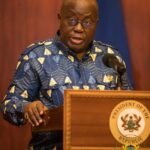The Beverage Consumers and Bar Owners Association of Ghana has instituted a campaign targeted at preventing wasted ballot papers in the forthcoming general elections.
The group per its campaign dubbed ‘Don’t Drink and Vote’; an advocacy against Rejected Ballots’ beckoned on the general public to avoid drinking before heading to the polling station to vote.
According to the Association, the issue of rejected ballots poses a key challenge to the electoral process and Ghana’s quest for democratic consolidation.
In a press release sighted by Awake News, the President of the association, Moses Onyah a.k.a. Dry Bone, says, they are troubled over the excessive number of rejected ballots after each election.
“We have come to the understanding that the number of rejected ballots recorded after each election is not only overwhelming but mind-blowing.
It stated that the spoilt ballots could have been included to the votes of political parties that lost elections to make them winners.
“The rejected ballots have caused lots of problems in elections and denied some political parties from winning elections.”
The number of rejected ballots recorded in the first round of the 2008 presidential race for instance, was unprecedentedly higher than ever; both in terms of percentages and in terms of figures.”
The association opined that “if rejected ballots were a political party, they could boast of a steady increase in popularity ahead of the smaller parties since Ghana’s return to multiparty democracy in 1992.”
“Again, had the rejected ballots been valid, one of the two leading contestants (Nana Addo Dankwa Akufo-Addo of the NPP or late Prof John Evans Atta Mills of the NDC) might have won the first round of the elections.”
The group indicated that, Ghana could have saved the “additional resources needed to organise a second, not to mention another three weeks of political rivalry and tension between the NPP and NDC.”
“According to the Electoral Commission of Ghana, as many as 205, 438 ballots were rejected in the 2008 elections which constituted 2.4% of total 8,671,272 votes cast.
Hypothetically, the “rejected ballot party” placed third in the 2008 presidential race ahead of Dr Papa Kwesi Nduom of the Convention People’s Party (CPP) who placed third with 113,494 (1.34 %) behind Prof. John Evans Atta Mills of the NDC who placed second with 4,056,634 (47.92%),” the statement read.
“As aptly argued by Adcock (2005), at the very minimum, consolidating democracy requires the existence of free, fair, and recurring elections allowing the citizenry of a country to choose representative leaders.
“We ‘the Beverage Consumers and Bar Owners Association of Ghana are of the view that “if the public, do away with drinking on December elections, we will record a less number of rejected ballot and this will help the various candidates.”
Citing, “Per this campaign, we are also advocating that the public ensures this year’s election is devoid of conflict and violence. The votes can determine the future of a political party. We are appealing to Ghanaians to vote wisely”,.
Read the full statement below:
BEVERAGE CONSUMERS AND BAR OWNERS ASSOCIATION OF GHANA PRESENTS ‘DON’T DRINK AND VOTE, A CAMPAIGN AGAINST REJECTED BALLOTS’
Good morning Leadership of Beverage Consumers And Bar Owners Association Of Ghana, Drunkards Association of Ghana, The Media, Ladies and Gentlemen, we are here this morning to campaign against ‘Drinking and Voting’.
We deem this fit to hold this press conference because we have come to the understanding that the number of rejected ballots recorded after each election is not only overwhelming but mind-blowing as a result, we have a few things to say.
Ghanaians have shown their preference for the ballot box than the barrel of the gun in changing their leaders since 1992. Five general elections have been held and in all these elections, Ghanaians have chosen their leaders.
These elections have generally been described as free, fair, peaceful, and transparent. There have also been several improvements in the electoral processes all aimed at ensuring that the people are able to choose their own leaders and express their wishes in a manner that helps the consolidation of Ghana’s democracy.
There is now an independent Electoral Commission that has replaced the interim one put in place in 1992; there are now transparent ballot boxes replacing the opaque ones that were used in 1992; there are photo identity cards for the electorate that marches their data in the voter’s register; there are periodic updates of the voter’s register to ensure that it contains a clean and up-to-date list, and there are Inter-Party Advisory Committee Meetings instituted by the Electoral Commission to meet with political parties to discuss general issues affecting their interest and the conduct of elections.
Regardless of these measures, the issue of rejected ballots poses a key challenge to the electoral process and Ghana’s quest for democratic consolidation.
Since 1992, there has been a phenomenal increase in the incidence of rejected ballots during elections making it difficult for the wishes of the electorate to be known.
Sometimes, these rejected ballot papers have amounted to huge percentages of the votes in excess of the total number of votes garnered by some political parties.
In other instances, these rejected ballots could have been added to the votes of political parties that lost elections to make them winners.
Although Ghana is getting matured democratically, it is clear that individuals are getting confused with the voting process.
The number of rejected ballots recorded in the first round of the 2008 presidential race for instance, was unprecedentedly higher than ever; both in terms of percentages and in terms of figures.
According to the Electoral Commission of Ghana, as many as 205, 438 ballots were rejected in the 2008 elections which constituted 2.4% of the total 8,671,272 votes cast. Hypothetically, the “rejected ballot party” placed third in the 2008 presidential race ahead of Dr. Papa Kwesi Nduom of the Convention People’s Party (CPP) who placed third with 113,494 (1.34 %) behind Prof. John Evans Atta Mills of the NDC who placed second with 4,056,634 (47.92%).
Indeed, the percentage of the rejected ballots far outstripped the combined performance of Dr. Edward Mahama of the People National Convention (PNC), Emmanuel Ansah Antwi of the Democratic Freedom Party (DFP), Thomas Ward Brew of the Democratic Peoples Party, Kwesi Amoafo Yeboah, an Independent Candidate and Kwabena Adjei of the Reformed Patriotic Democratic (RPD).
In short, if rejected ballots were a political party, they could boast of a steady increase in popularity ahead of the smaller parties since Ghana’s return to multiparty democracy in 1992.
Again, had the rejected ballots been valid, one of the two leading contestants (Nana Addo Dankwa Akufo Addo of the NPP or Prof. John Evans Atta Mills of the NDC) might have won the first round of the elections.
This would have saved Ghana the additional resources needed to organize a second, not to mention another three weeks of political rivalry and tension between the NPP and NDC.
As aptly argued by Adcock (2005), at the very minimum, consolidating democracy requires the existence of free, fair, and recurring elections allowing the citizenry of a country to choose representative leaders.
The rejected ballots have caused lots of problems in elections and denied some political parties from winning elections.
Due to this, we (Beverage Consumers and Bar Owners Association of Ghana) are calling on the general public not to drink and vote.
We are of the view that if the public, do away with drinking in the December elections, we will record a less number of the rejected ballot and this will help the various candidates.
Per this campaign, we are also advocating that the public ensures this year’s election is devoid of conflict and violence.
The votes can determine the future of a political party.
We are appealing to Ghanaians to vote wisely.
Thank you for your attention.
President
H.E. MOSES ONYAH Njindan AKA DRY BONE








